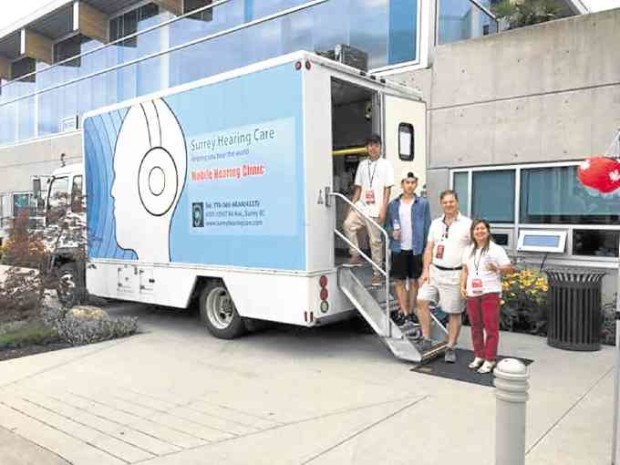CEBU CITY—Maria Santos Greaves, a call center agent in Canada for three years, walked away from a four-year marriage that made her feel incomplete and stagnant.
The marital spat was nonstop and had taken its toll on her son, Sebastian. Bouts of depression were draining her strength and self-confidence. She felt lost and purposeless.
Then she found herself in a personality development seminar that enabled her to work internally and to realize a dream to set up a hearing clinic in Canada.
In 2009, Greaves became president and owner of Surrey Hearing Care Inc. and opened her first clinic. In seven years, three more branches sprang up and another was on the drawing board.
She is also contemplating on launching a branch in the Philippines, the country of her birth.
Commitment
Even before she began her medical business, Greaves has been involved in outreach missions with the Rotary Foundation and the Canadian Medical Mission Society. Her team ran a mobile hearing Clinic to provide free consultations in several areas of Canada.
For her commitment and passion to help people live a better life, Greaves was recognized as one of the Top 100 Most Influential Filipinas in the World by the Filipina Women Network. She also belonged to the Top 25 Canadian immigrants chosen by public votes in a project organized by Ottawa.
The awards attest to the strong character and accomplishments of Greaves, but to her, life is a journey of discovering her strength and battling the debilitating effects of depression.
Greaves graduated with a Pharmacy degree at Centro Escolar University in 1991. She worked as an audiometrist at Manila Hearing Aid Center in Quezon City, a job that made her see the importance of the sense of hearing in a person’s life.
On the side, however, she was engaged in direct selling, which thrust her into depression after her distributors failed to pay her back. She was mired in debts and business losses.
At 26, she locked herself in a room. She did not sleep and eat. She felt hopeless.
When asked about how she was doing, members of her family would just say she was having “mood swings.” Her depression was a taboo topic to them.
Worsening condition
When her condition became severe, Greaves was confined at the basement of a hospital in Makati City. She was suffering from Stevens-Johnson syndrome, a rare and serious disorder of mucous membranes and skin. She had flu-like symptoms and painful red rashes spread all over her body—a reaction from the strong antidepressants she was taking
“I felt so horrible. It was the end of the world for me,” Greaves said.
In the midst of her struggle, she realized the importance of a person’s aural sense. “I saw the correlation between pharmacy and hearing in the sense that the drugs from pharmaceutical companies treat the cause while my work—which involved testing the hearing of the person and fitting hearing aids—was treating the side effect, which is hearing loss caused by the drugs,” she said.
Hearing disorder
“Hearing is very important as it affects your personal life. If you don’t hear, there is a tendency for you to isolate yourself. That can lead to depression,” she said.
In 1998, her condition was getting better. After her parents obtained tourist visas to Canada, where her younger sister lives, she decided to get one herself. She flew the following year.
From 2000 to 2004, she worked as a store merchandiser, insurance agent and a call center agent. She met fellow Filipinos who introduced her to the man who became her husband. The relationship lasted for only four years. She packed her bags and took her son
with her.
She worked for a hearing clinic for three years and for another one for eight months. She studied hearing instrumentation at MacEwan University in Edmonton province and underwent further training with the International Hearing Society.
With her friend, Vikki Mackay, who specializes in hearing instruments, as partner, borrowed capital loan and clinic equipment, she opened a clinic in 2009, and two more in 2011 and 2014. This month, a fourth facility will be opened.
The clinics have 13 employees and handle a total of 9,000 patients.
The chance to explore the possibility of starting one in the Philippines came when she attended the Filipina Leadership Global Summit in Cebu City recently. She intends to make hearing aids more affordable and accessible to the less privileged.
“I believe that as long as you do good to people, your business will continue to prosper,” she said.
